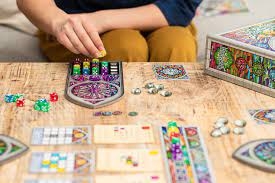"Beyond the Roll of Dice: The Timeless Allure of Board Games"

Introduction:
In an era dominated by digital entertainment, the enduring charm of board games remains a testament to the timeless appeal of face-to-face interactions and strategic challenges. Board games, with their rich history and diverse genres, continue to captivate players of all ages. In this exploration, we'll dive into the world of board games, uncovering the roots, evolution, and the enduring social and intellectual benefits that these analog treasures bring to the table.
The Historical Tapestry of Board Games:
Ancient Beginnings:
Board games trace their origins back to ancient civilizations. Games like Senet in Ancient Egypt and Go in Ancient China served not only as sources of entertainment but also as tools for strategic thinking and skill development. The simplicity and accessibility of these early games laid the foundation for the diverse landscape of board gaming we know today.
Medieval and Renaissance Influence:
The Middle Ages saw the emergence of chess and backgammon, games that combined strategy with a touch of luck. These games reflected the societal values of the time and became staples in courts and noble households. The Renaissance period further enriched the world of board games with the creation of classics like checkers and the introduction of playing cards.
The 20th Century Revolution:
The 20th century witnessed a surge in the popularity and variety of board games. The introduction of Monopoly in the 1930s marked a significant cultural phenomenon, demonstrating the potential for board games to transcend mere entertainment and become cultural touchstones. The mid-century brought classics like Scrabble, Risk, and Clue, further diversifying the landscape.
Evolution of Board Games:
Modern Classics:
The latter half of the 20th century and the early 21st century saw the rise of modern classics like Settlers of Catan, Carcassonne, and Ticket to Ride. These games introduced innovative mechanics and themes, appealing to a new generation of players seeking strategic depth and engaging gameplay.
Board Games in the Digital Age:
Despite the rise of digital gaming, board games have not only survived but thrived. The digital age has facilitated the creation of hybrid experiences, where physical board games are complemented by companion apps, enhancing gameplay with interactive elements while preserving the essence of face-to-face interaction.
Renaissance of Tabletop Gaming:
In recent years, there has been a renaissance in tabletop gaming, with a surge in the popularity of board games among diverse demographics. The rise of crowdfunding platforms has empowered independent game designers to bring their creations to life, resulting in an unprecedented variety of games that cater to different tastes and preferences.
The Social and Intellectual Benefits of Board Games:
Social Connection:
Board games serve as a powerful catalyst for social interaction. Whether with family or friends, the act of gathering around a table to play fosters meaningful connections, encourages communication, and creates lasting memories. Board games provide a shared experience that transcends the digital divide, emphasizing the importance of face-to-face engagement.
Cognitive Skills Development:
Beyond the social aspect, board games challenge players cognitively. Strategic thinking, problem-solving, and decision-making are inherent to many board games, promoting the development of critical thinking skills. From planning ahead in chess to resource management in Settlers of Catan, these games offer a fun and engaging way to exercise the mind.
Stress Relief and Entertainment:
Board games offer a welcome respite from the hustle and bustle of daily life. The immersive nature of gameplay allows players to temporarily escape into different worlds, fostering relaxation and stress relief. The joy derived from a well-executed strategy or a surprise twist in the game adds an element of entertainment that transcends the virtual realm.
Educational Value:
Many board games are designed with educational intent. From word games like Scrabble that enhance vocabulary to math-centric games like 7 Wonders that teach resource management, board games have the potential to be valuable educational tools, blurring the lines between learning and play.
Conclusion:
As we navigate the ever-evolving landscape of entertainment, the enduring popularity of board games stands as a testament to the human desire for tangible, social, and intellectually stimulating experiences. From the ancient game boards etched in stone to the modern cardboard masterpieces of today, board games have woven themselves into the fabric of our culture. Whether seeking a strategic challenge, a social gathering, or a break from the digital screen, board games continue to offer a diverse and enriching array of experiences that bridge generations and bring people together across the table. In a world where trends may come and go, the board game remains a steadfast companion, ready to unfold its magic with the roll of the dice or the shuffle of cards.
- Industry
- Art
- Causes
- Crafts
- Dance
- Drinks
- Film
- Fitness
- Food
- Jogos
- Gardening
- Health
- Início
- Literature
- Music
- Networking
- Outro
- Party
- Religion
- Shopping
- Sports
- Theater
- Wellness
- News


